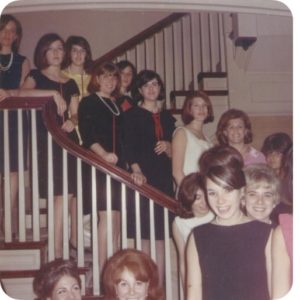
A month ago, 19 of my sorority sisters logged on to our first Zoom reunion. We’ve been meeting weekly ever since. A few minutes before the start of this past week’s session, I happened on an essay about “the Iotas” in a rarely-visited directory on my laptop. The piece, written eleven years ago when Consequential Strangers came out, still rings true.
♦ ♦ ♦
2009: My sorority sisters have shown up for me in mini-droves over the last few months.
They came to my talk at the Lancome boutique – an ideal venue for recovering Jewish “princesses”* who morphed into competent, successful, and still very attractive older woman.
They also came to my 92nd Street Y talk in Tribeca. I was touched that “the girls” schlepped downtown from their familiar Upper East/Westside haunts.
At all such events, we always eat together afterward. We sit in a carefully-chosen restaurant, forty-odd years older than our coed selves, as if no time passed.
We show off pictures of our children and grandchildren. Not surprisingly, there isn’t a mieskeit in the bunch! Our offspring are descendants of “the Iotas” – the pretty, smart, and privileged (predominantly Jewish) girls. We were loved and hated. Some detractors even accused us of checking out labels during “rush” week when freshman hopefuls traipsed through our door.

For the record, it wasn’t true. Before every open house, Jane, our intrepid “rushing chairman,” coached us in the art of taking visitors’ coats: fold quickly, label in, eyes elsewhere.
Still, we were exclusive. You had to have something special to be “an Iota.” As pledges, we tolerated mild hazing (as I remember it), learned the songs, the lineage (Sadie April Glotzer was a founder), and the “secret word.” Our mission, as sworn-in sisters, was to “get to know” incoming coeds who might fit in.
Today, as grown women, we aren’t necessarily proud of those practices. We understand why our adult daughters poke fun. Some even wonder whether her present self would be an Iota.
But as we sit together after all these years, time and fraught memories fade away. We reminisce (“Whatever happened to…”). We talk about our current lives. Somehow, health and aging inevitably work their way into the conversation. We don’t feel like women in their sixties. With each other, we are still Us.
Sure, we see wrinkles, saggy necks, little tufts of fat over the eyelids. But isn’t 65 the new 30?
We swap stories about cosmetic options. Several already do Botox, peels, and more. One woman — a drop-dead beauty in college, still a stunner in her sixties — admits to having a facelift only because of peer pressure. She was the last holdout in her affluent Long Island community.
I get it. I am starting to see gray hair. I hate the sunspots on my face, the deeper lines. And when I catch a glimpse of my naked body in the mirror these days, I think. What alien force abducted me and replaced my body with this one?
My sorority sisters offer me a different mirror. The reflection I see in their eyes reassures me. It’s not because I “look good” in their eyes (although we enthusiastically tell each other we do). It’s because I see that I’m not alone in the journey.
To be sure, each of my sorority sisters has traveled a different path from me–and from each other. But we all know where we came from. The Iotas are my history and continuity.
It’s a gift to reconnect with women who knew me when. Women who remember my parents. Women who knew my younger self and how I once danced to Louie, Louie. It is even more remarkable to have several of those women accessible to my older self.
♦ ♦ ♦
* Historical and contextual note: The Iotas’ attended college a decade before Leslie Tonner’s “Nothing but the Best: The Luck of the Jewish Princess” was published – but it was us she wrote about. As Kirkus review put it in 1975:
Ms. Tonner, who is admittedly the result of a modified royal schooling, traces the evolution of the present product through several generations–from the shetl drudge (you should marry well) to the Americanized Cinderella-at-the-ball, groomed for Doing Well, with good schools, fine clothes and Culture. Tonner celebrates milestones in the adored parental investment, beginning with “a veritable Versailles of clothing,” a “mile of wire installed in the mouth,” the nose job and Shopping I and II conducted by Mother…
The concept that resonated with me in Nothing but the Best was “Jewish Princess balls” — a special brand of persistence honed by privilege. Too bad I didn’t keep my dog-eared paperback copy — one is now available on Amazon for $175.
What a lovely break from our obsession with COVID! Thank you. So glad you have this renewed connection. This sense of continuity reminds us that life does carry on.
Thank you as well for the musical interlude. Haven’t heard that one in a long time.
We NEED a break!